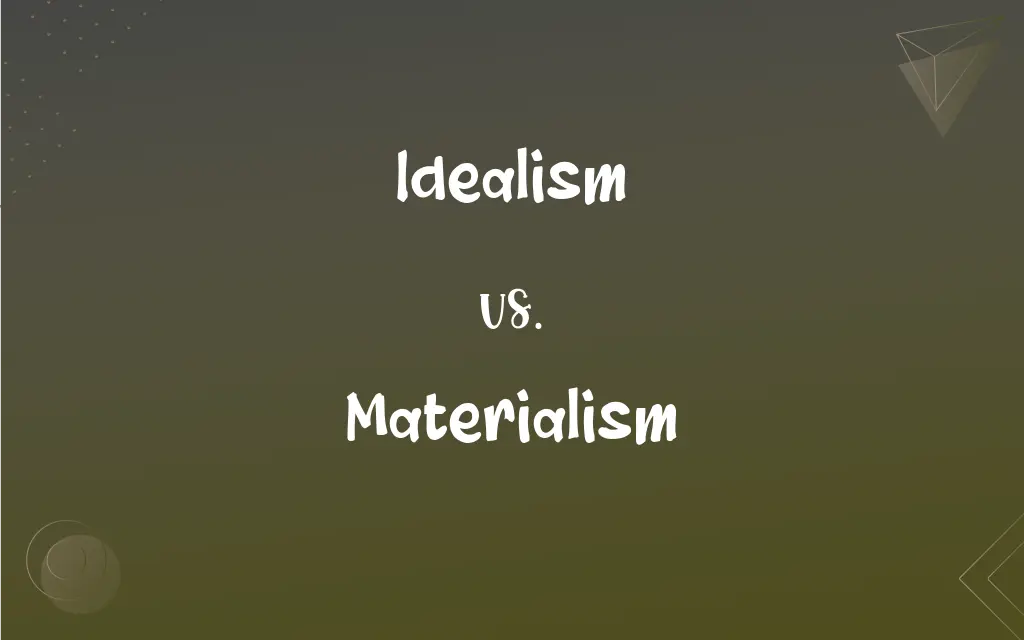Idealism vs. Materialism: What's the Difference?
By Janet White || Published on December 10, 2023
Idealism refers to a philosophical theory prioritizing ideas, thoughts, and consciousness over material objects. Materialism refers to a philosophical view asserting that material things and physical phenomena are the only reality.

Key Differences
Idealism asserts that reality is fundamentally shaped by ideas, consciousness, and mental constructs. Materialism, in contrast, holds that physical matter and its interactions constitute the only true reality.
Idealism often involves the belief in intangible qualities like mind, spirit, or values shaping existence. While, materialism focuses on tangible, measurable entities, denying the independent existence of mind or spirit.
In idealism, understanding and perception are central to forming the world's nature. However, in materialism, the external world's nature is independent of human perception or understanding.
Idealism can lead to a focus on possibilities and potentials, transcending physical limitations. Whereas, materialism tends to emphasize practicality, physical constraints, and empirical evidence.
Ethically, idealism may promote ideals and moral principles as guiding truths. Materialism often grounds ethical decisions in outcomes and tangible effects rather than abstract principles.
ADVERTISEMENT
Comparison Chart
Basis of Reality
Ideas, consciousness
Physical matter, tangible phenomena
Focus
Intangible qualities (mind, spirit)
Tangible, measurable entities
Perception's Role
Central in shaping reality
Reality independent of perception
Approach to Existence
Emphasizes possibilities, ideals
Emphasizes practicality, empirical evidence
Ethical Grounding
Guided by ideals, moral principles
Based on outcomes, tangible effects
ADVERTISEMENT
Idealism and Materialism Definitions
Idealism
Idealism is the belief that ideas and consciousness are the primary elements of reality.
His idealism led him to value thoughts and ideas over material possessions.
Materialism
Materialism is the belief that physical matter is the only or primary reality.
His materialism was evident in his focus on acquiring physical wealth.
Idealism
Idealism emphasizes the role of mental processes in shaping the physical world.
Through idealism, she believed that positive thinking could influence her environment.
Materialism
In philosophy, materialism holds that everything arises from material interactions.
The scientist’s materialism led her to seek physical explanations for all phenomena.
Idealism
Idealism in art or literature focuses on ideal representation over realism.
The novel's idealism was evident in its portrayal of a perfect utopian society.
Materialism
Materialism can also refer to a preoccupation with material objects and comforts.
The culture's materialism was reflected in its consumer-driven economy.
Idealism
In philosophy, idealism posits that reality is mentally constructed or immaterial.
Plato’s theory of forms is a classic example of idealism.
Materialism
Materialism implies that spiritual or supernatural forces do not exist.
Materialism rejects the concept of an afterlife, focusing on the physical world.
Idealism
Idealism can also mean pursuing high or noble principles, often unrealistically.
His idealism drove him to campaign for world peace.
Materialism
Materialism in sociology relates to the importance placed on physical possessions in social status.
His study revealed the materialism of modern society, where status is often linked to wealth.
Idealism
The act or practice of envisioning things in an ideal and often impractical form.
Materialism
(Philosophy) The doctrine that physical matter is the only reality and that everything, including thought, feeling, mind, and will, can be explained in terms of matter and physical phenomena.
Idealism
Pursuit of one's ideals, often without regard to practical ends.
Materialism
The theory or attitude that physical well-being and worldly possessions constitute the greatest good and highest value in life.
FAQs
What role does perception play in idealism?
In idealism, perception is fundamental in shaping and interpreting reality.
What is the core principle of idealism?
Idealism centers on the belief that ideas and consciousness form the core of reality.
Does idealism deny the existence of the physical world?
Idealism doesn't necessarily deny the physical world but sees it as secondary to mental and spiritual aspects.
How does materialism view the universe?
Materialism views the universe as composed of physical matter and governed by material interactions.
Is idealism impractical in everyday life?
Not necessarily, but idealism may emphasize principles or beliefs over practical considerations.
Does idealism affect ethical decisions?
Yes, idealism often guides ethical decisions based on moral principles or ideals.
Is materialism linked to consumerism?
Yes, materialism in a cultural context is often linked to consumerism and emphasis on material possessions.
Can idealism and materialism coexist in one's worldview?
While contrasting, some individuals integrate aspects of both in their worldview.
Can materialism lead to a fulfilling life?
This depends on individual values, but materialism may overlook non-material aspects of fulfillment.
How does idealism influence art and literature?
In art and literature, idealism can lead to the portrayal of idealized, often unrealistic scenarios.
How do idealism and materialism differ in education?
Idealism in education emphasizes moral and intellectual development, while materialism may focus on practical and empirical learning.
Does materialism support environmental conservation?
Materialism doesn't inherently support conservation, though it can recognize the physical consequences of environmental degradation.
How do idealism and materialism view success?
Idealism may define success in terms of ideals achieved, while materialism may measure it in tangible accomplishments or possessions.
Does materialism reject spirituality?
Materialism generally rejects spiritual or supernatural explanations in favor of physical ones.
Can idealism contribute to societal progress?
Yes, idealism can inspire actions towards high principles and societal improvement.
Can materialism explain all aspects of human experience?
Materialism may struggle to fully explain subjective experiences like emotions or consciousness.
Can idealism lead to unrealistic expectations?
Yes, idealism can sometimes lead to expectations or goals that are unrealistic in the physical world.
How does materialism approach the concept of consciousness?
Materialism often views consciousness as a byproduct of physical brain processes.
How does materialism view human relationships?
Materialism might view human relationships in terms of tangible benefits and physical interactions.
Is idealism optimistic?
Idealism often entails an optimistic view of the potential of ideas and human spirit.
About Author
Written by
Janet WhiteJanet White has been an esteemed writer and blogger for Difference Wiki. Holding a Master's degree in Science and Medical Journalism from the prestigious Boston University, she has consistently demonstrated her expertise and passion for her field. When she's not immersed in her work, Janet relishes her time exercising, delving into a good book, and cherishing moments with friends and family.






































































